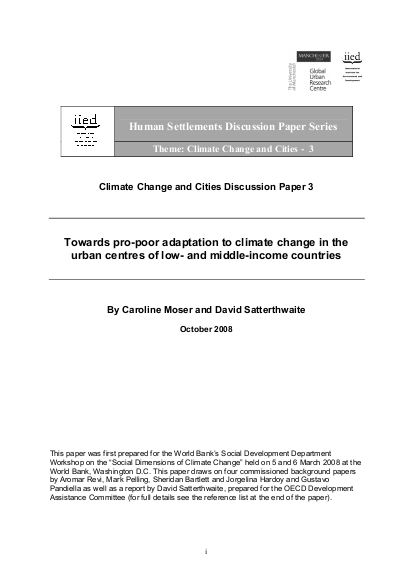
This paper outlines a framework for adaptation to climate change for urban areas in low- and middle-income nations that is pro-poor and that enhances the capacity of low-income households and community organizations to contribute to such adaptation. It begins by describing how urban centres in low- and middle-income countries concentrate a large proportion of those most at risk from the effects of climate change – as people‘s lives, assets, environmental quality and future prosperity are threatened by the increasing risk of storms, flooding, landslides, heatwaves and drought that climate change is likely to bring. It also points to the weaknesses in the local institutions with responsibility for addressing this and the very large deficiencies in the infrastructure and services needed for protection. It also discusses the lack of attention given to supporting adaptation in urban areas by scientists, governments and international agencies, and considers why this is so. To improve understanding of the problems and to contribute to identifying solutions, the paper introduces an asset-based framework focused on households and community organizations. As a conceptual approach this helps to identify the asset vulnerability to climate change of low-income communities, households and individuals within urban areas. It also considers the role of assets in increasing adaptive capacity. The asset-based framework provides an operational tool, an asset-adaptation framework, which serves to highlight the measures needed to address four aspects of risk and vulnerability. These four aspects are illustrated in relation to extreme weather events. The first consists of the measures needed to protect those most at risk from extreme weather: safer sites, protective infrastructure and better-quality buildings – to prevent extreme weather events from causing disasters. The second, third and fourth aspects focus on limiting the impact of extreme weather events for low-income or otherwise vulnerable groups through household and community actions for pre-disaster damage limitation, immediate post-disaster response, and longer-term rebuilding. This highlights the many synergies between poverty reduction and resilience to climate change, and clarifies how vulnerability and risk are influenced by income level, age and gender. The paper then highlights three reasons why strengthening, protecting and adapting the assets and capabilities of individuals, households and communities is far more important in low- and middle-income countries than in high-income countries. The first is the limitations in urban governments’ adaptive capacity, especially in providing needed protective infrastructure and services to low-income populations. The second reason is the unwillingness of many city or municipal governments to work with low-income groups, especially those living in informal settlements (which usually include most of those most at risk from floods and storms). The third reason is the key role of assets in helping households and communities to cope with disasters. This focus on strengthening the asset base of households and communities is also a key means of building more competent, accountable local governments. The paper discusses how a substantial part of adaptive capacity relates to the ability of households and community organizations to make demands on local governments and, wherever possible, to work in partnership with them. Case studies illustrate the effectiveness of such partnerships in some nations. The paper concludes by discussing the roles for local and national governments and international agencies in supporting adaptive capacity at all levels.
Resource collections
- Climate emergency
- UN Habitat - Urban Response Collection
- Urban Response - Urban Crisis Preparedness and Risk Reduction
- Urban Response Collection - Community Engagement and Social Cohesion
- Urban Response Collection - Economic Recovery
- Urban Response Collection - Environment and Climate Change
- Urban Response Collection - Housing, Land and Property
- Urban Response Collection - Urban Crisis Response, Recovery and Reconstruction
- Urban Response Collection - Urban Resilience